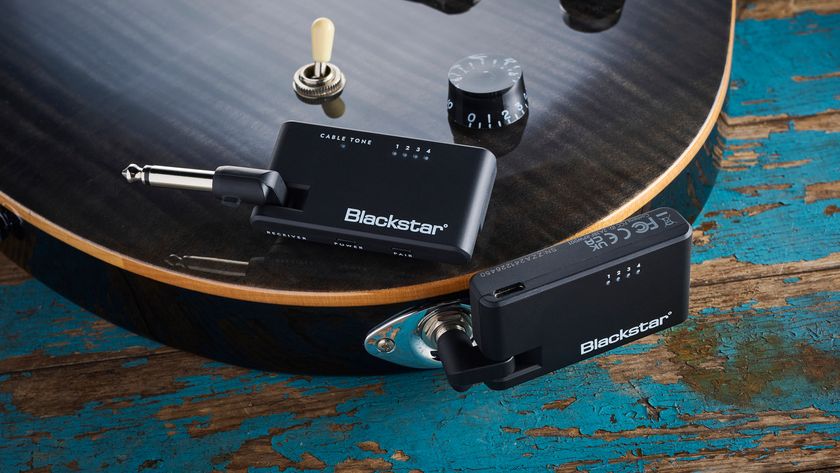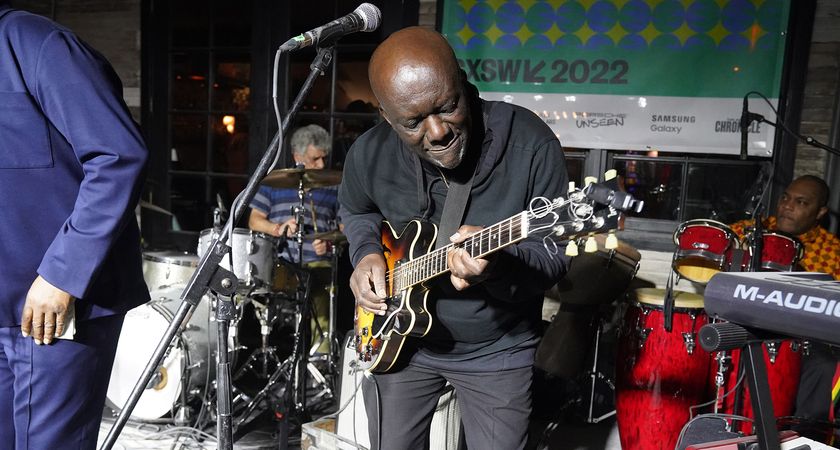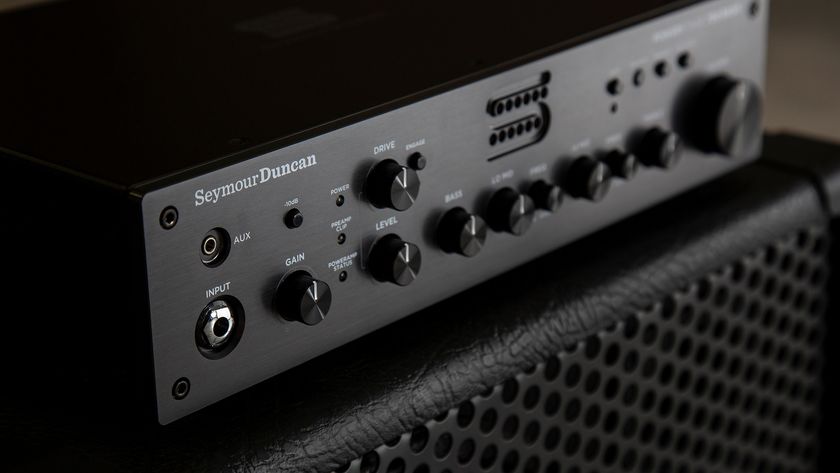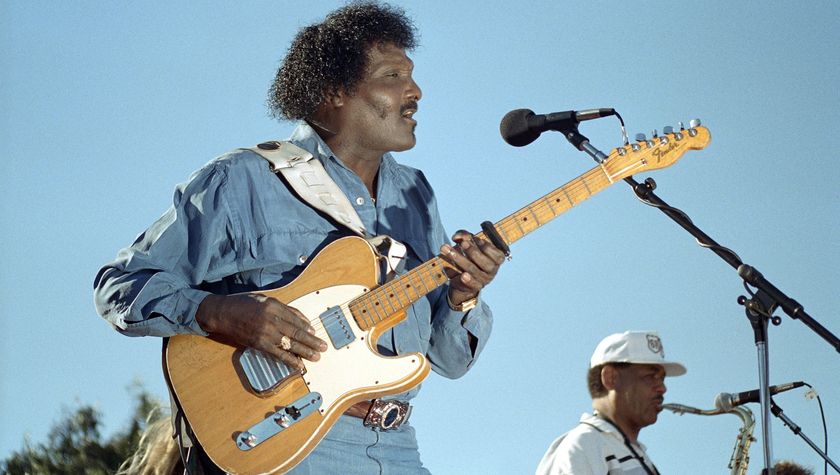Interview: Bluesman Geoff Achison Discusses Gear, Recording and His New Album, 'Little Big Men'

Geoff Achison’s professional career began at age 13 in Malmsbury, Australia.
Within a few years, he was recognized as an accomplished blues guitarist and started his own band, The Souldiggers. Taking full control of his career, Achison launched a label, Jupiter Records, in 1994; to this day, he continues recording independently and recently re-mastered and re-released his last studio project, Little Big Men.
Achison is labeled a bluesman and has won numerous awards for his work. What makes him unique is not only his instrumental skills but also his multifaceted approach. His music blends traditional blues with soul, jazz, and even touches of rock and roll. In the midst of a U.S. tour to promote Little Big Men, he took some time to answer questions about his album, his band and his technique.
GUITAR WORLD: Can you select one track from Little Big Men that you think best represents you and your guitar work?
It’s tough to pick just one as there are many sides to what we do as a band. Still, I have a favorite moment on “Rule The World” in the outro, where the interplay between the band just soars and there’s an incredible drum roll from Gerry [Pantazis] underpinning the whole passage of play. It’s those collective events I’m always hoping for when I play with the guys.
Is woodshedding still necessary at this point in your career?
Perhaps it’s more accurate to say it’s desirable rather than necessary. Playing the guitar happens nearly every day as a matter of course, but I’d certainly put more practice in if I could find the time. Oddly, though, the more success I’ve had as an independent musician, the less time there seems available to focus purely on actually learning more about guitar playing.
Get The Pick Newsletter
All the latest guitar news, interviews, lessons, reviews, deals and more, direct to your inbox!
The lack of time is due in part to the multitude of tasks that need attention to keep a music career running, and then of course my main role in life as a husband and father. So I ain’t practicing six to eight hours a day like I used to. Fortunately, I practiced a lot when I was younger, so that’s what I’m burning on. I tell any young students to practice like crazy now, while you have the chance!
Early on, what were some of the biggest challenges you faced as a player and how did you overcome them?
When I entered the music business, it was still largely being run by record labels. If you didn’t have record label interest, you simply weren’t going to make a record. I made little demos on a portable cassette player and got politely — and sometimes impolitely — rejected. One day, a guy took me aside at one of my local gigs and asked why I hadn’t made a record. His name was Nic Quittner, and with his experience running a small business, he suggested I overcome this difficulty by forming my own record label. That was bold thinking at the time.
Anyway, we decided to go halves in producing my first CD. It was a steep learning curve, but we soon learned how to be self-sufficient and also got into building our first website and using the latest e-mail technology where you could send a letter to maybe 100 people at once — gosh! It really doesn’t sound like such a big deal now, but we were one of the first independent blues artists in Melbourne to do such a thing.
It was hard work promoting the release, distributing the CDs to stores and putting our own tours together, but we ultimately managed to steer a path through the business and took it to an international level. I hear a lot of young artists tell me how tough it is out there these days, and while I agree it’s tough, the fact is that it’s always been tough. You’ve just got to persevere and find a way to make it work.
With all of the technology and gear available, and new gear every day, you remain a minimalist. Do guitarists put too much emphasis on gear?
Of course they do, but that’s part of the fun of it! What’s the point of learning electric guitar and never plugging it into a wah-wah pedal? That’s like never trying ketchup on a burger! When I was learning guitar, though, I simply didn’t know better and developed techniques for emulating sounds I heard made with gadgets I either didn’t understand or couldn’t afford, so now it’s just my thing. Gadgets tend to get in the way of my playing, mostly because I can’t work them properly. But in truth they can sound just amazing in the right hands ... er, feet!
Acoustic versus electric: At what point in the creative process do you know which way the song is going? Does it sometimes change course during that process?
It’s simply a case of which axe I’m holding at the time of invention. That is, if I come up with a composition on acoustic guitar, it’s an acoustic song, and vice-versa. It’s rare that I feel comfortable playing what I consider an electric Souldiggers song in my solo acoustic set, but then I’ve occasionally been surprised that with a little perseverance and rearranging, certain tunes can come up great being performed in either format ... or even with a string quartet, as we’ve done with some of my classically trained friends.
Can you play everything you hear in your head?
No, I’m not particularly gifted in that sense. I was always better at improvising rather than copying what I heard. I guess when you’re discovering your limitations and strengths it’s best to choose a field that puts your strongest suits to the fore.
Your current tour includes some solo acoustic dates as well as full band shows with The Souldiggers. What can you tell us about your band?
Early on, I was a huge fan of John Mayall & The Bluesbreakers. Mayall’s band was constantly changing as circumstances dictated, but the band was always The Bluesbreakers no matter who was in it. I found myself traveling a lot and found it impossible to keep a steady lineup. So I took my lead from the Bluesbreakers model and named my band The Souldiggers as a description of how I wanted the music played rather than who was playing on any given night. It’s been a successful formula, too, and I’ve got some of my favorite players on this tour.
Ted Pecchio on bass is one of the funkiest and funniest dudes I’ve ever been on the road with. We have a Grammy Award-winning drummer, Mr. Yonrico Scott, joining us for some dates, which we’re thankful for, as he is a busy man with his Royal Southern Brotherhood project. Greg Baba is on drums for the other shows, and I’ve been a fan of Greg’s since discovering his playing on King Johnson albums.
Many fans come to shows and want to hear the songs the way they know them from the recordings. Blues music, however, often free-forms the arrangements onstage. How far can you take things when rearranging a song without losing the audience?
On a good night, we can take things to Mars and back again and have the audience follow us all the way. It’s part of the art. We do like to stretch out and create something special through improvising, but you’re right, it is a fine line. Most of our crowd expects that we’ll improvise on the theme, and that’s what I ask of the band, but I can’t stand jams that descend into pointless noodling or overblown shredding. That’s what can lose the audience.
What I’m after are those truly special musical moments that can only be found when the musicians play soulfully and instinctively. To do that you need a certain amount of free-form attitude, but without arrogance or ego getting the upper hand. On a good night, if we do it well enough, the audience becomes part of the process and we can go just about anywhere together.
How do you keep your sound consistent night after night when you deal with different venue sizes and sometimes playing outdoors?
I suppose my tendency to stick with the one instrument helps. I’ve been playing the same electric guitar for ten years now and so I know it inside out. I put a lot of work into the setup to get it exactly how I want it. I know what it should sound like and how to adjust it when it’s not right. My acoustic axe is fairly new. It’s a beautiful handmade Jay Lichty instrument built just for me. It’s so well made and natural sounding that I don’t want to change a thing.
— Alison Richter
Alison Richter interviews artists, producers, engineers and other music industry professionals for print and online publications. Read more of her interviews right here.


Alison Richter is a seasoned journalist who interviews musicians, producers, engineers, and other industry professionals, and covers mental health issues for GuitarWorld.com. Writing credits include a wide range of publications, including GuitarWorld.com, MusicRadar.com, Bass Player, TNAG Connoisseur, Reverb, Music Industry News, Acoustic, Drummer, Guitar.com, Gearphoria, She Shreds, Guitar Girl, and Collectible Guitar.

“I get asked, ‘What’s it like being a one-hit wonder?’ I say, ‘It’s better than being a no-hit wonder!’” The Vapors’ hit Turning Japanese was born at 4AM, but came to life when two guitarists were stuck into the same booth

“Let's play... you start it off now, Stevie”: That time Stevie Wonder jammed with Stevie Ray Vaughan... and played SRV's number one Strat




![[L-R] George Harrison, Aashish Khan and John Barham collaborate in the studio](https://cdn.mos.cms.futurecdn.net/VANJajEM56nLiJATg4P5Po-840-80.jpg)



